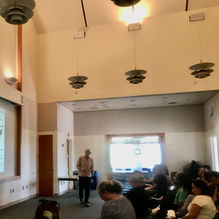
High sugar consumption, especially via sugar-sweetened beverages (SSBs), is a major contributor to the development of non-communicable diseases, such as Type II diabetes, cardiovascular disease, cancer, and obesity. SSB companies target and disproportionately impact the health of low income communities and communities of color, and resist efforts to reduce consumption. Increasing tap water access on campus is a healthy alternative to SSBs and bottled water, which will assist in preventing dehydration and weight gain among the campus community.



Sales of SSBs and bottled water contribute to pollution and waste problems locally and globally. Plastic pollution, in particular, leaches chemical additives and endocrine disrupting chemicals, negatively affects soil and nutrient cycling, and threatens wildlife and marine life via ingestion and entanglement. Improving tap water accessibility on campus will minimize our waste output and greenhouse gas emissions from the consumption of these beverages.
Rethink Your Drink
Our Initiative
The UC HBI’s goal is to decrease the consumption of SSBs on our UC campuses, and increase the availability of tap water as an alternative.
The UCSB HBI Research Group is dedicated to understanding the environmental, health, social justice and financial impacts of beverages on the UCSB campus. Our initial focus has been estimating the net environmental impact of reducing SSB and bottled water sales on campus and increase tap water accessibility. We will also be estimating the reduced risk of diet related diseases if SSBs are substituted with tap water. In Fall 2020, we are organizing conversations about UCSB's beverage environment and how it can be improved to support environmental health, human health. We plan to estimate the reduced health are costs due to improved health over time, as a result of these changes, and the environmental benefit of reduced health care, like reduced greenhouse gas emissions.
The UCSB HBI Implementation Group, led by Katie Maynard in the Sustainability Program, is responsible for surveying the campus beverage environment, and arranging installation of new water filling stations.
Projects
UCSB Parents & Family Weekend Survey Results
During UCSB’s Parents’ Weekend (November 2nd, 2019), a survey assessing parent perspectives on food and beverage consumption and sales on campus was distributed at Prof. David Cleveland’s presentation (“Is There a ‘Best’ Diet for us, our Students, and Planet?”). Click to learn more and read our results!
The potential environmental benefits of substituting SSBs and bottle water with tap water on a university campus
- IN PROGESS -
The potential net environmental impact of replacing both SSBs and bottled water with tap water are being investigated through our research. We are working with UCSB Dining to gather data on on campus. Documenting these co-benefits could increase policy and behavioral incentives for change. Click to learn more and join the conversation!









